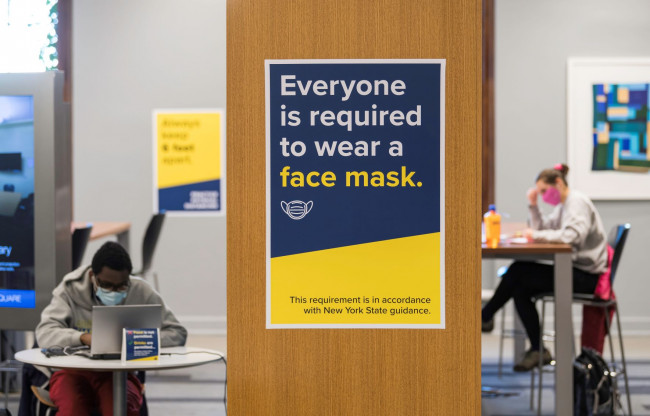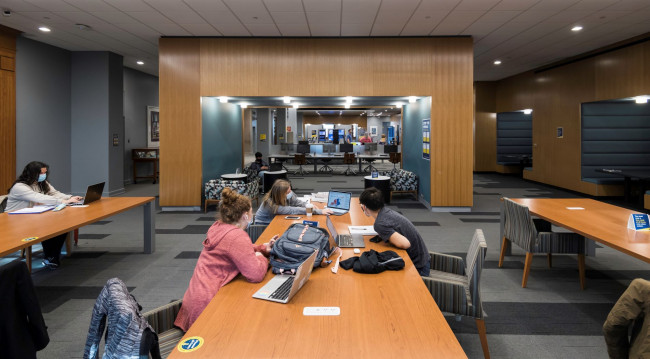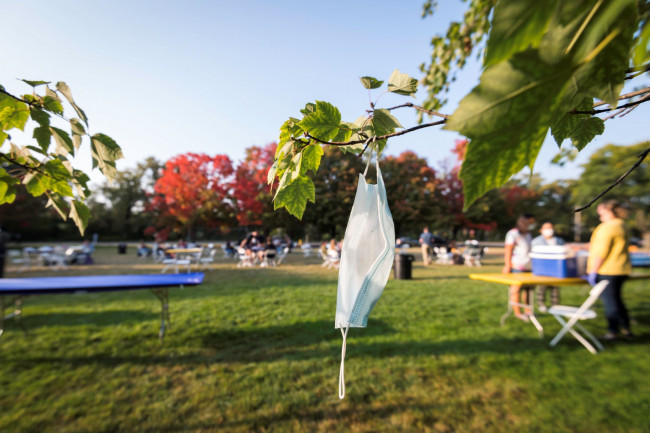
You are about to read Parts IV, V, and VI of the University of Rochester Libraries oral story on COVID-19. To get the full story, pause here, read Parts I, II, and III, and come back. Read them already? Perfect! Let’s get into Part IV.
Part IV. One step closer to normal
The University “restarted” on August 27. Libraries reopened. Faculty and staff were back. Students were back. The fall 2020 semester was happening in-person—mostly.
Todd Smith (section supervisor, Collection Strategies, RCL): As it became apparent that furloughs and layoffs were going to happen, I feared morale would be very low when [my team] returned. To my amazement, they came back stronger than ever.
Diana Golemb (project management and physical spaces assistant, RCL): I didn’t want to be furloughed. Part of it was the fear that we wouldn’t come back. Nobody knew what to expect. So coming back felt really good.
Trina Lowery (section supervisor, Carlson Science and Engineering Library, RCL): Usually, the beginning of the year is exciting, but it’s also intensely hectic. It was so much more subdued. In a weird way, I think it fit the situation. It was easier to deal with all the changes.
John Schoen (library assistant, Acquisitions, RCL): The first day [back], when I opened the door, there were just thousands and thousands of journals, books, newspapers… It was daunting. But it was also a reminder of how much work we do. It gave me a feeling of pride to see a physical manifestation of how we keep things moving.
Rose Flickner (library assistant, Patron Services, RCL): It was good to be back on campus full–time. It felt like we were one step closer to normal.
Melinda Wallington (section supervisor, Department of Rare Books, Special Collections, and Preservation, RCL): I had some concerns and some anxiety about exposure and how we could mitigate risk. But I appreciated being repeatedly told [to work at] my comfort level.
Marc Bollmann (senior library assistant, Art & Music Library, RCL): Being in public spaces for hours is difficult for me. I suffer from hyperhidrosis. As soon as we were back to manning [the Q&i desks], I had this immediate reaction of panicking. I’d be trying to help the patron as much as possible, but I’m sweating and I’m thinking, “What do they see?” But my main concern is my spouse, who is in a vulnerable population. I certainly don’t want to bring [COVID] home to her. All of these things play into the psychology of working in the library.
Randall Cook (assistant dean, RCL): I committed to really enforcing the social distancing, because we wanted our spaces to be safe and to be able to be open and used. We adopted a pretty heavy monitoring process.
Amy Marple (section supervisor, Patron Services, RCL): It was tasked to us at the Q&i desk to go around and uphold the health guidelines. [The RCL] wanted it to be peer-to-peer, so it fell on the students who work for me. They felt a little overwhelmed and, I think, isolated in the task so we brought in ambassadors.
Randall Cook (assistant dean, RCL): When we discovered [our monitoring] was still not enough, we created a new student job called “student ambassadors,” who monitored for social distancing and mask-wearing.

Due to COVID safety guidelines, the Art & Music Library, Robbins Library, and Rare Books and Special Collections are only accessible by appointment.
Katie Papas (section supervisor, Robbins Library, RCL): Robbins is a super popular study space, and that’s gone now. I really miss the regulars and the people you would see just because they like Robbins. It’s just sort of meant thinking through our services in a completely different way because we don’t have the freedom of having an open door.
Autumn Haag (assistant director, Department of Rare Books, Special Collections, and Preservation, RCL): Showing someone some sort of object through a camera, over Zoom, is not the same thing as being able to hold it, turn the pages yourself. Smell it. Look at it. I will never again take for granted having access to our physical collections.
Claudia Pietrzak (student experience and social media manager, RCL): I’ve talked to a lot of students who message [the RCL] on Instagram from their home in China or some other country they’re in. They’ll say, “I miss the libraries. Can you take more photos and videos of…” and they’ll name some library space. It’s helped the students remain connected to the libraries while they’re away.
Laquanda M. Fields (student projects and student employment manager, RCL): There were times where I thought, “Am I doing enough?” I felt like the days were just bleeding together.
Marc Bollmann (senior library assistant, Art & Music Library, RCL): Time has compressed so much. It’s very bizarre. I forget if something happened two week ago or a month ago.
Part V. Positive for COVID
For some staff members, COVID did more than affect their social and professional behaviors. A lot more.
Trina Lowery (section supervisor, Carlson Science and Engineering Library, RCL): I was happy to be back. But I was also a little nervous.
Diana Golemb (project management and physical spaces assistant, RCL): I figured as long as I was careful, I’d be OK. Plus my office is kind of isolated. I have been working the service points, but even then, I feel pretty protected.
Trina Lowery: The first time that Mary Ann [Mavrinac, vice provost and Andrew H. and Janet Dayton Neilly Dean of the University of Rochester Libraries] sent an email saying there was a patron who had tested positive for COVID, I was freaked out. At that point, I hadn't had come in any kind of close contact with anyone who had COVID.
Diana Golemb: My friends [outside the University]—almost all of them got it. I’ve managed to avoid it.
Trina Lowery: It’s really hard to keep [Carlson Library] open. We have a lot of people, including students, out because they might have been around someone who has COVID. There’s a lot of unpredictability there, and there isn’t a big pool of people to help us out. But I ended up getting [COVID].
Diana Golemb: My mom had COVID. She was in the hospital for 42 days. As a matter of fact, she wasn't supposed to live. She cheated death three times. We weren’t able to see her because [the hospital] wasn’t allowing visitors. But when your loved one is moved into comfort care, or they call in the palliative care team, then you’re allowed to be with them. And that’s what we did. As a family we pushed for whatever they could do to prevent her from dying. And it worked.
Trina Lowery: When I got COVID, I had actually worked [at Carlson Library] the day before I came down with symptoms, but there wasn’t a single other human in the building. It was right after Christmas, so it was kind of perfect timing. My husband ended getting it from me, but he was asymptomatic. I was really sick for at least two weeks, but I didn’t have to be hospitalized.
Diana Golemb: I’m more nervous about it now that my mom has had it than I was before.
Trina Lowery: The thing that’s concerning for me is I don’t know how I got it. Nobody else that [my husband and I] were around or knew got it. It makes me nervous for other people, people who have more [vulnerabilities] and could die from it.
Part VI. Distance brought us together
COVID-19 isn’t out of our lives, but there’s finally an end in sight. Getting this far has been no small (physical/mental/emotional) feat, and it’s left an impression that will last for many years to come.
Jim Farrington (head of Public Services, Sibley Library, Eastman School of Music): We have a lot of experience with change, and I think that helped us roll with the punches.
Emily Clasper (director, Service Strategies, RCL): We just accepted that things we were going to do—none of them would be perfect. We just had to keep rolling, and we would refine as we went. Sometimes that meant stepping forward and sometimes that meant stepping back.
Tom Clifford (section supervisor, Art & Music Library, RCL): That’s what we do. We adapt to changing circumstances, changing technology, changes in how students like to work and how professors like to teach—and we respond. It’s kind of cliché, but the only constant is change.
Dan Zager (associate dean and head librarian, Sibley Library, Eastman School of Music): The library is where things happen. It generates conversation and collaborative work. I think that’s something librarians feel strongly about—not only uniting our students and faculty with collections, but with one another. That’s why we fight to keep it open.
Autumn Haag (assistant director, Department of Rare Books, Special Collections, and Preservation, RCL): There's a global pandemic, but research is still happening. People are still interested in our collections. There's still interest in learning and making the world a better place, and contributing to it. Being able to help our researchers has been really, really rewarding.
Anna Siebach-Larsen (director, Rossell Hope Robbins Library, RCL): A faculty member or a student will come into Robbins, and I notice their palpable desire to have a human connection. They [may have] been affected by COVID, participated in Black Lives Matter protests, or they have families in Texas or abroad and can’t get home. All those experiences come out when they’re asking me for a book or how to find something. I think that’s part of the isolation we’ve all been grappling with.
Todd Smith (section supervisor, Collection Strategies, RCL): It’s kind of ironic that the distance brought us together. But that’s what happened.

Jennifer Raynor (director, Miner Library, Medical Center): We took care of each other and backed each other up. Everyone was so willing to help out. It was really amazing. It leaves me feeling like we can do anything.
Todd Smith (section supervisor, Collection Strategies, RCL): People who may have been just coworkers before are now your buddies. And now you have all these meetings with them, and you look forward to seeing how they’re doing and what shows they’re [watching].
Jeffery Jones (section supervisor, Physics-Optics-Astronomy Library, RCL): The reserves processing team has a daily video chat. I can’t tell you how key these regular meetings have been to my work and emotional survival. In addition to solving work-related problems, the meeting has allowed us to vent, laugh, connect, and remain human and grounded. I really don’t know where I would be without the support of these good people. I owe them an emotional debt.
Amy Marple (section supervisor, Patron Services, RCL): The camaraderie has really helped. I think that’s one of the pluses we’ve gotten out of this. I don’t think that’s going to go away. I think people will be much more willing to reach out to each other.
Mary Ann Mavrinac (vice provost and Andrew H. and Janet Dayton Neilly Dean of the University of Rochester Libraries): I will remember how our team rose to the occasion in spite of personal hardship, fear, and uncertainty, demonstrating their outstanding creativity, leadership, expertise, and compassion. I found this inspirational.
Marc Bollmann (senior library assistant, Art & Music Library, RCL): We’ve lived through a science fiction film. It’s just been very surreal.
Anna Siebach-Larsen (director, Rossell Hope Robbins Library, RCL): I think it’s been intensely traumatic for everyone who works here and all our users.
Frank Scarcelli (mail and physical spaces assistant, RCL): At the very beginning, I was really kind of down, thinking, “Is this ever going to end?” And then you finally start to see some [vaccines] roll out.
Trina Lowery (section supervisor, Carlson Science and Engineering Library, RCL): I think a year from now it will be pretty different. I tend to be optimistic even in the worst of times, but I do feel hopeful.
Rick McRae (catalog librarian, Sibley Library, Eastman School of Music): I had a serious illness last year, and I was looking back on it, and I thought, “Man—that seems like it happened to a different person.” In similar ways, I think I’ll look back on the horrible pandemic years of 2020 and 2021, and I’ll most remember the sounds of the birds singing and the kids playing because it was great to hear some aspect of normality during a time when everything else in life was upside down. The rest will feel like we were on a different planet.∎
Interested in contributing to the University Archives COVID-19 project? Fill out this brief submission form. If you have questions, contact Melissa Mead at archives@library.rochester.edu. Enjoy reading about the University of Rochester Libraries? Subscribe to Tower Talk.

